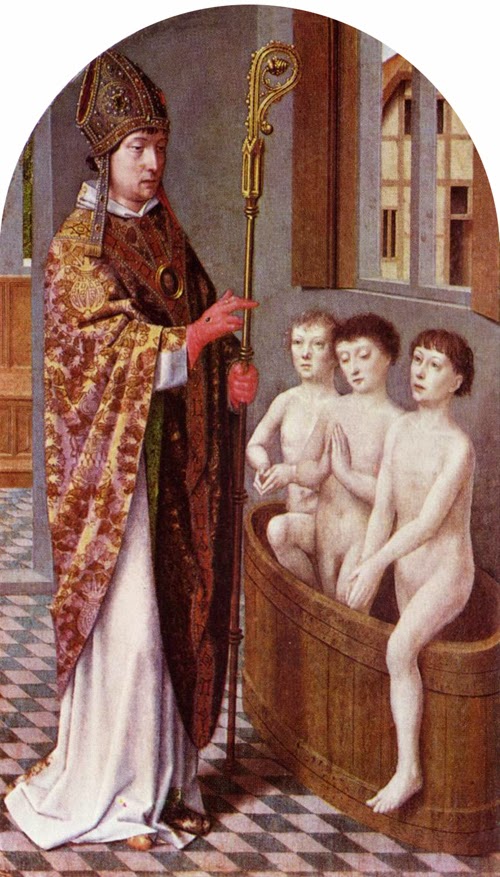There is a hiddenness that is commendable. This is the hiddenness we find in the famous story of St. Nicholas and his liberation of the young women from a life of sexual servitude. In putting the money at the window, or down the chimney, and, as some legends say, into the stockings hung up to dry, while himself endeavoring to remain unseen, unknown, unacknowledged, Nicholas acted rightly. His acts of charity, even as ours, while meant to bind us more deeply to our neighbor, ought even more to direct both us and them to the very source of that charity, to the Lord Jesus Christ, who suffered for us on the Cross with ineffable charity that he might sanctify the people by his own blood. It is this same hiddenness that animates those secret, latter-day helpers of St. Nicholas by filling stockings and shoes across the world with candy, fruit, and presents, that those who receive might be directed not to the earthly minister of these kindly gifts, but to the joy and to him who is the author of all joy.
There is another hiddenness that is altogether detestable. This is the hiddenness we find in another story about St. Nicholas, in which the wonder-working bishop, stopping by an inn while on a journey, discerns by supernatural insight that the meat he would be served by the innkeepers is in fact the flesh of three boys, slain by the innkeepers, their bodies picked in a barrel and meant to be provided as food for the guests. This is the hiddenness inherent in all wickedness, the hiddenness that perfers the obscurity of darkness over the manifest glory of the noon-day sun. This is the hiddenness that seeks to plunge not only itself, but all the world, into and unending and unrelenting night of terror rather than turn from its self-inflicted horror and be saved. This is the hiddenness that even today prowls the world, snatching the innocent and helpless, the poor and lonely, and most especially children and the elderly, as its preferred victims. This is, of course, also the hiddenness that cannot escape the penetrating and luminous gaze of the Father of lights, nor the gaze of those filled with his light and truth.
Yet there is another hiddenness which, if less obviously detestable, is nonetheless no better in the long run. This is the hiddenness of those who would shrink back from hope, the hiddenness of the talent placed in the hole dug in the earth by the fearful servant. It is not that the servant did anything positively horrible, but all the same his action, or better yet his inaction, proved ultimately fatal. Why? In seeking to preserve the little he had been given, in acting out of fear rather than hope, in seeing the demand of his master not as the promised assurance of one with confidence in abundant success, but rather a veiled threat of certain failure, the servant prevented himself from entering into the joy of his lord. Said differently, if we do not dare to hope, dare to act in confidence that what God has given us, however little, will and must be abundant in grace, then we have made ourselves to be the kind of people that cannot, that will not be able to enjoy an eternity with God, who have refused to take sure and certain hope in the life-giving power of the grace of our Lord Jesus Christ.


No comments:
Post a Comment